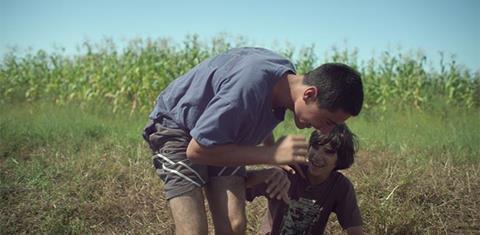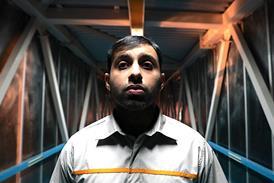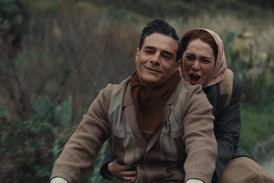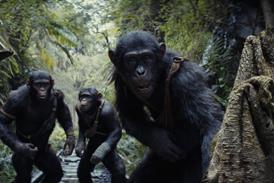Dir/scr: Lasha Tskvitinidze. Georgia. 2014. 89mins

The best way to describe Lasha Tskvitinidze’s first feature I Am Beso (Me var Beso) is as a youthful prequel to an as yet non-existent future film about a young man in search of his identity. This debut can’t rate as much more than a tentative and excessively self-indulgent exercise, which, had it been edited by anyone else but its director and his producer, would have ended up as a sympathetic, moody short portrait on what it means to grow up in a small, broken down, Georgian town.
The desolate portrait of a town gradually being abandoned by its inhabitants and the human climate prevailing among those who still live ther, is ultimately more interesting than the characters themselves and probably deserved to be explored a bit more.
Beso (Tsotne Barbakadze) is a 14 years old prankster who spends most of his time with his pal Beka (Soso Tarkashvili) roaming around the empty fields, exploring abandoned homes in ruined buildings, and occasionally visiting school as well. Beso would love to become a rapper one day, but at the rate he is working on his hit, it will take him a long time before he gets to make the record that will bring him his first million. Until that happens, the disheveled tandem, Beso and Beka, spend their time bickering with each other, inventing all sorts of harmless mischiefs, clumsily attempting to drag girls and trying to stay away, as much as possible, from a frontal clash with the class bullies who are always on their case.
On top of which, every time he goes home, Beso has to cope with his father, Tamaz (Zaza Salia, the only professional in the cast), a victim of the Chernobyl disaster who sits around doing nothing except complaining, his long-suffering mother, the family’s only breadwinner, and a gay brother (Leri Beqauri) who teaches dancing to aspiring young girls.
Nothing much that is significant happens in the course of the film itself, which consists mostly of the camera following Beso around as he covers the territory, and though there is always implied irony in his relations with the world around him, it practically never reaches a subtitle-reading audience, even if they may be far more effective in Georgian. The final couple of sequences, one showing Beso as he walks away from the camera along the main street, the other following his gay brother who is running away from trouble to Armenia, can’t suggest much in the way of a conclusion beyond conveying the general idea that both brothers (each in his own way) can’t stand their place of birth, and everything in it, any more.
The desolate portrait of a town gradually being abandoned by its inhabitants and the human climate prevailing among those who still live ther, is ultimately more interesting than the characters themselves and probably deserved to be explored a bit more. More scenes like the one in which the guardian of what used to be a cultural center and is now no more than a disaffected ruin, chases the rowdy boys because you do not fight with each other in a cultural temple, would have been certainly welcome.
Both Barbakadze and Tarkashvili look natural enough in the main parts but the non-professional edges show up every time they have to actually play anything more than themselves, while Zaza Salia, as the enraged father venting his impotent frustration on everyone around him, seems only too eager to launch into every tirade written for him.
Production company/contact: Pansionat Film, pansionatfilm@gmail.com
Producer: Nodar Nozadze
Cinematography: Shalva Sokurashvili
Editor: Nodar Nozadze, Lasha Tskvitinidze
Main cast: Tsotne Barbakadze, Soso Tarkashvili





















